Helium Mobile is a wireless telephone service built on the decentralized and encrypted Helium network.
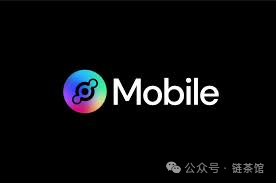
This innovative service provides cellular connectivity through the decentralized Helium network and is supported by T-Mobile's extensive 5G infrastructure. Traditional mobile networks are often controlled by a few large companies, limiting the coverage and quality of service. Helium Mobile utilizes hotspots deployed by community members to provide dynamic network coverage, aiming to create a broader and more reliable network.
In addition, in the traditional model, users are merely consumers of the service. Helium Mobile allows users to actively participate in network construction by deploying devices and verifying network coverage, and in return, they receive MOBILE tokens as rewards, essentially transforming users into co-owners and beneficiaries of the network. In other words, subscribers have a unique opportunity to earn tokens by using the service and providing services to the local community through hotspots and wireless antennas.
Operation Principle
The operation of Helium Mobile is based on a unique peer-to-peer network model that does not rely on traditional cellular base stations but rather on a distributed hotspot network deployed by community members to provide service. These hotspots provide coverage and generate tokens, namely HNT, which can be converted into MOBILE tokens.
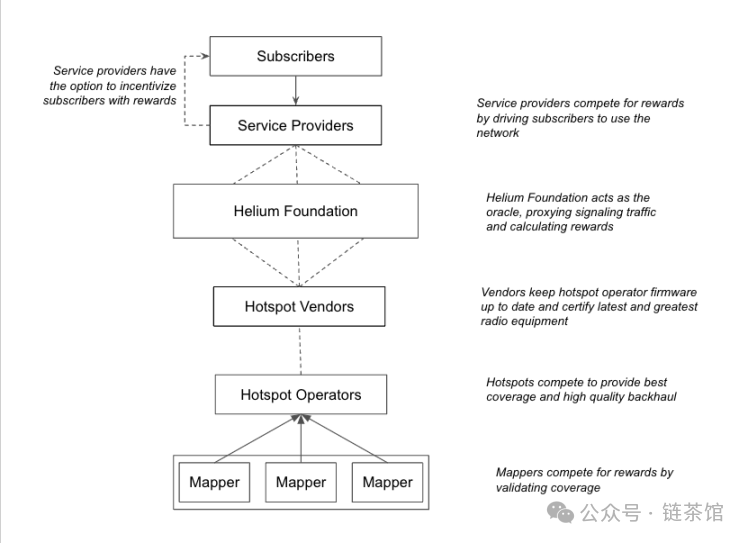
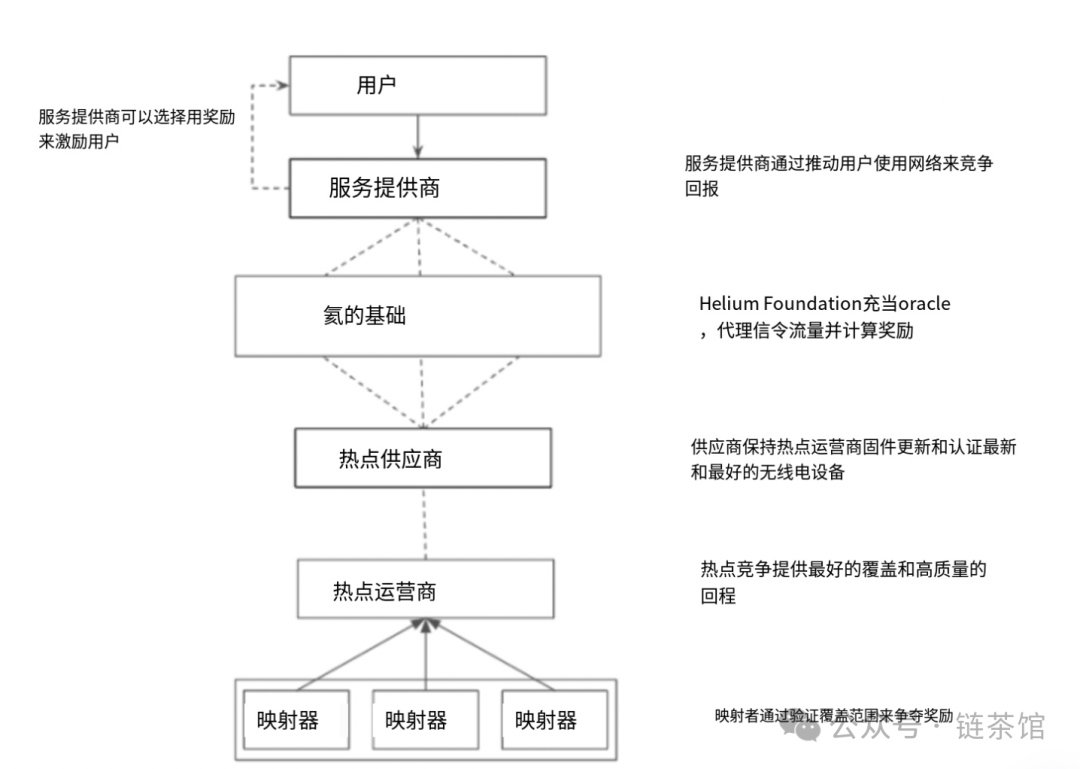
Here are the detailed operation principles:
Community Hotspot Deployment: Ordinary people like you and me can deploy Helium hotspots in their homes, workplaces, or other locations in the community. These hotspots can provide wireless network coverage for the surrounding area.
Application of Blockchain Technology: Helium Mobile is based on the decentralized encrypted network—Helium Network. This network allows anyone to develop and operate their own mobile network using token incentives. The entire system runs on the Solana blockchain, ensuring the security and efficiency of the network.
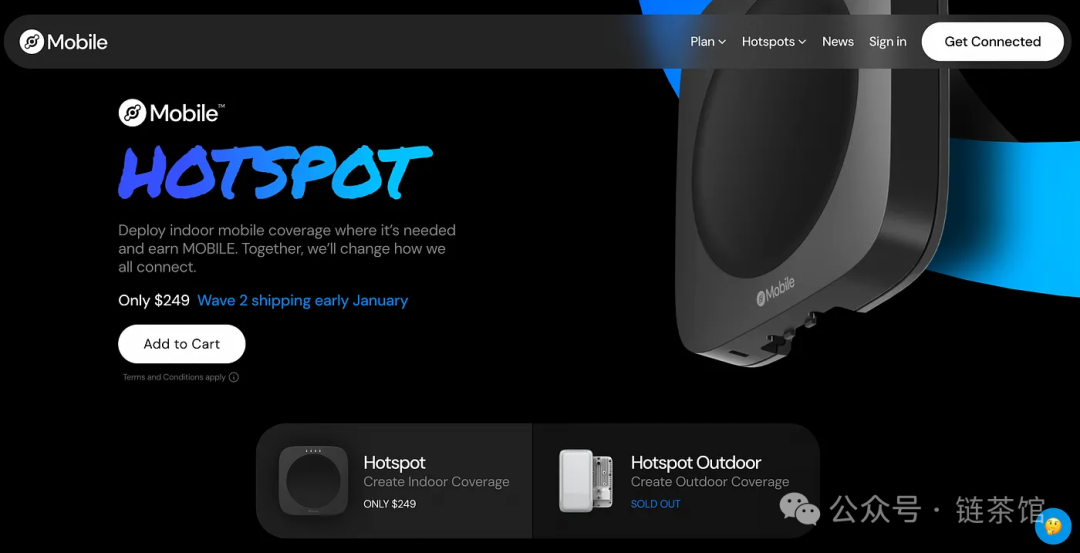
Token Generation and Usage: Deployed hotspots not only provide network coverage but also generate local tokens for the Helium network—HNT. Users can convert HNT tokens into Mobile tokens for paying mobile service fees or participating in network governance.
Integration with T-Mobile: Helium Mobile leverages the 5G infrastructure developed by T-Mobile. Users' devices can seamlessly switch between the Helium network and T-Mobile's extensive 5G coverage, ensuring service continuity and signal stability.
Energy Efficiency and Token Rewards: The LoRaWAN hotspots in the Helium network demonstrate excellent energy efficiency, consuming only about 5W of power. Furthermore, as hotspot providers, users can earn tokens by providing network coverage and also through participating in network governance and data sharing activities.
Even more amazing is that you can enjoy the benefits of Helium Mobile without creating a hotspot. You just need to register as a customer of the service and then connect to the nearest hotspot. Your phone can effortlessly move between the Helium network and T-Mobile's extensive 5G coverage, so you will never lose signal.
This model encourages community participation and innovation, while increasing network resilience in a decentralized manner, reducing reliance on a single service provider, potentially lowering costs, and improving service quality.
Core Mechanism
The core mechanism of Helium Mobile involves several key components that collectively support its decentralized wireless communication service.
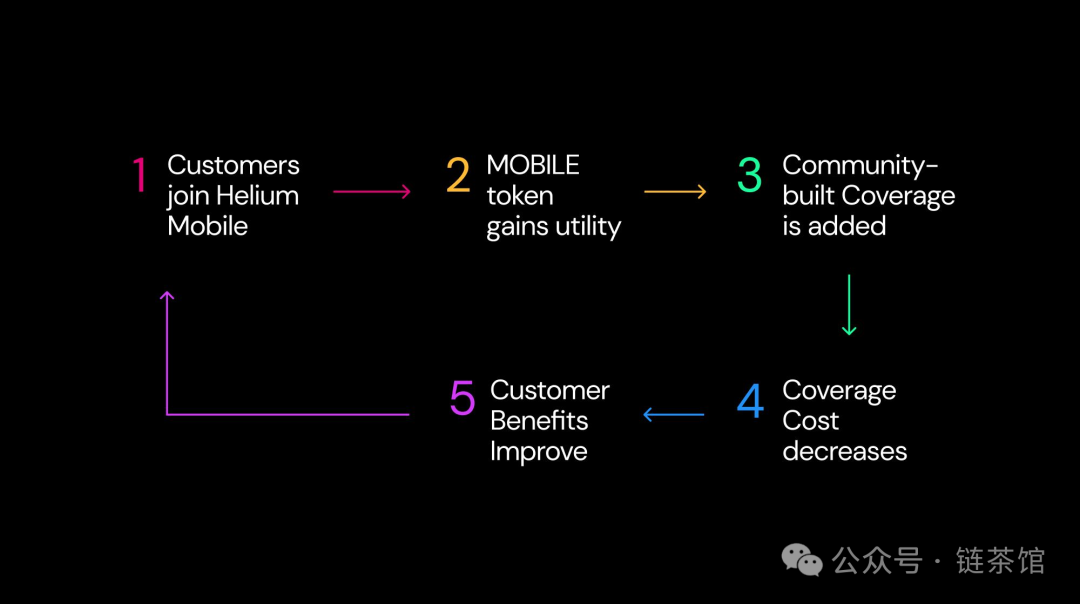
Here is a detailed introduction to these mechanisms:
Community-Driven Network Deployment
Hotspot Deployment: The Helium network relies on hotspots deployed by individuals and businesses to provide wireless coverage. These hotspots are purchased and deployed by community members to provide wireless network coverage on their properties. Deployers are rewarded with Helium network tokens (HNT) for providing network services.
Blockchain and Tokenized Incentives
Blockchain-based Operations: Helium Mobile operates on the blockchain, using smart contracts to automate network operations and user interactions, ensuring transparency and security of transactions and operations.
Token Incentives: Network participants (hotspot operators, users, etc.) receive economic incentives through Helium's tokens (HNT and Mobile). HNT is primarily used to reward network coverage providers, while Mobile tokens are used to pay for network service fees and participate in network governance.
Decentralized Network Management
User Governance: Helium Mobile advocates for network governance decisions to be made by its token holders, including rule changes and fee structure adjustments. This decentralized governance model enhances network adaptability and user participation.
Data Sharing and Transparency: Network operational data is publicly transparent, allowing users to access detailed information about network performance and coverage, increasing trust and network efficiency.
Smart Network Access and Switching
Seamless Network Switching: Helium Mobile devices can seamlessly switch between the Helium network and partner networks (such as T-Mobile's 5G network). This ensures that even in areas with insufficient Helium hotspot coverage, users can maintain a good connection.
Dynamic Resource Allocation: The network can intelligently adjust resource allocation based on real-time demand and resource availability, optimizing network performance and user experience.
Energy Efficiency and Eco-Friendliness
Low-Power Hotspots: Helium's LoRaWAN hotspots are designed for low-power IoT device network coverage, operating at very low power (about 5W), helping to reduce operating costs and environmental impact.
These core mechanisms of Helium Mobile combine advanced blockchain technology, community-driven participation, smart network management, and decentralized governance to support a powerful and innovative wireless network service platform. These mechanisms not only enhance network efficiency and coverage but also provide users with more economical and flexible mobile communication options.
Mobile Token
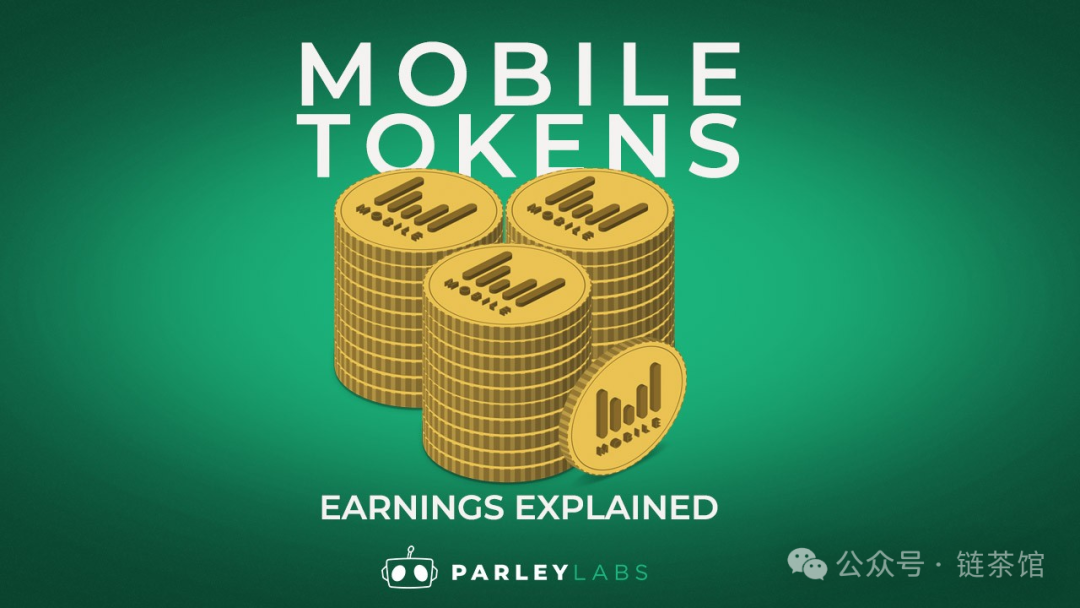
Use Cases
- Paying for Network Services: Users can use MOBILE tokens to pay for their monthly wireless service fees, including data plans, calls, and messaging services.
- Network Governance: MOBILE token holders may participate in voting on network policies, upgrades, and other decisions, thus engaging in network governance.
- Incentive Mechanism: Providing network coverage as a hotspot operator or participating in network activities as a user (such as data transmission) can earn MOBILE tokens as rewards.
- Staking Rewards: Users can stake their MOBILE tokens to support network security and operations, and may receive staking rewards.
- Data Sharing: Users can earn MOBILE tokens by voluntarily sharing network coverage data, encouraging community participation and network transparency.
Acquisition Methods
Users can acquire Mobile tokens by participating in network construction (such as providing network coverage), engaging in transactions, or purchasing them from the market.
MOBILE tokens are currently listed on the following cryptocurrency exchanges:
- Coinbase Exchange: The most popular trading pair is MOBILE/USD.
- Backpack Exchange
- Crypto.com Exchange
- CoinMarketCap: Although not an exchange, it provides token price tracking and may list which exchanges support MOBILE tokens.
- Bitget: The leading global cryptocurrency exchange and Web3 company announced the listing of Helium's 5G network governance token MOBILE.
Supply
The total supply of Mobile tokens is 82.26 billion MOBILE, with a maximum supply of 200 billion MOBILE. The current circulating supply is 82.26 billion MOBILE, accounting for 41.13% of the total supply.
500 billion MOBILE tokens were pre-mined and distributed to the network operations fund managed by the Helium Foundation at the launch of the Mobile Network. A portion of this allocation has been distributed to Mobile Network hotspots throughout the genesis period.
MOBILE began its emission on August 1, 2022, with the first tokens minted on August 12, 2022. The emission rate halves every two years, resulting in an overall deflationary state.
The emission plan for MOBILE was proposed in HIP53, starting from February 1, 2023. 5G hotspot owners will receive 6.6 billion MOBILE tokens per month, incentivizing subscribers to register, share data, or demonstrate various other valuable behaviors to promote network development. The reward will increase by more than double compared to the genesis period, but the PoC algorithm remains unchanged. The emission plan was officially updated in HIP-79 on March 19, 2023, following updates in HIP-75 and HIP-77.
Mining Process
Buying and Setting Up 5G Hotspots: Requires purchasing compatible 5G hotspot devices and Citizens Broadband Radio Service (CBRS) small cell radios. The devices need to be connected to the internet and set up correctly.
Registering with SAS: 5G hotspots must be online and registered with the Spectrum Access System (SAS). The SAS is a system maintained by the Federal Communications Commission (FCC) to ensure the efficient use of wireless spectrum resources.
Hotspot Deployment: Deploy hotspot devices in suitable locations to provide 5G network coverage. Proper placement of hotspots is crucial for maximizing coverage and mining potential.
Participating in the Network: Once the hotspot is online and registered with SAS, it will begin providing 5G coverage for the Helium network. According to the network's design, the hotspot will automatically perform the required tasks to mine MOBILE tokens.
Mining and Earning Tokens: Hotspot devices mine MOBILE tokens through specific mechanisms in the Helium network (such as Proof-of-Coverage). Depending on network activity, you may also receive other forms of rewards.
Token Allocation
Data Hotspot Operators: 40% of the total tokens, as a reward for operating hotspots that provide data coverage.
Mappers: 20% for participants who contribute map data for network coverage.
Service Providers: 10% for entities that provide various services to the network.
veHNT Holders: 6% for users who stake their HNT tokens and receive vested Helium Network Tokens (veHNT).
Oracles: 4% for systems or entities that provide external data (such as real-world information) to the blockchain.
Proof of Coverage: 20% for participants who help verify network coverage.
Token Performance
The current price of MOBILE tokens is $0.002019, with a 31.42% decrease in the past 7 days.
The market cap is $166.06 million, ranking 303rd.
The 24-hour trading volume is approximately $4.98 million, showing a 7.86% increase compared to the previous period, indicating increased trading activity despite the price decrease.
Track Analysis
The Helium Mobile project belongs to the decentralized communication network track, which combines blockchain technology and wireless communication technology to provide decentralized network services and enhance network user privacy and control.
Similar projects to Helium Mobile include DENT Wireless (a global mobile data exchange platform that allows users to buy, sell, or donate data through the DENT app); Althea (a decentralized internet service provider that enables users to provide and purchase bandwidth services, with a focus on improving network service availability and reducing costs); ThreeFold Network (a decentralized cloud service marketplace where users can purchase storage and computing resources), and others.
The Helium Mobile project currently has over 50,000 users, and based on annual benchmarks, the total number of users may reach 530,000 in a year.
Team/Partners/Funding Situation
Team
The Helium Mobile project is initiated by Helium Inc., founded by Amir Haleem, Sean Carey, and Shawn Fanning. Here is a brief background of their team members:
Amir Haleem: Amir Haleem has extensive experience in game development and esports before joining Helium. He has held senior positions in multiple successful game projects and has accumulated professional knowledge in online gaming and virtual reality.
Sean Carey: Sean Carey's background is in technology and product development. Before joining Helium, he has extensive experience in technical leadership and product management, particularly in software development.
Shawn Fanning: Shawn Fanning is a well-known internet entrepreneur, most famous for creating Napster, a revolutionary P2P music sharing service. He has a deep background in network technology and innovation and has been involved in multiple tech startup projects.
Partners
Hardware Suppliers: Manufacturers providing Helium hotspot devices, such as Rakwireless, Bobcat Miner, and Nebra.
Network Operators: Collaborating mobile network operators, such as T-Mobile in the United States, with whom Helium has signed a partnership agreement to support the deployment of 5G services.
Technology Platforms and Services: For example, the Solana blockchain, which Helium has chosen for token issuance to leverage its high throughput and low transaction fees.
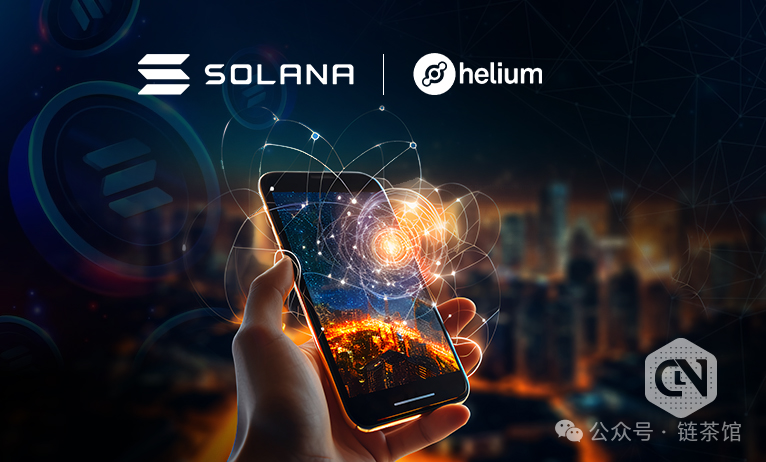
Funding Situation
Helium Mobile has undergone multiple rounds of funding during its development, with the most notable being the recent round:
Funding Round: Series D
Funding Amount: $200M
Valuation: $1.2B
Major Investment Institutions: Tiger Global and FTX Ventures
In this funding round, Helium Mobile (Nova Labs) received significant financial support, further strengthening its position as a decentralized communication network in the market. This funding will be used to expand its business, including promoting its blockchain-based 5G network services.
Investor Background:
Tiger Global: This is an internationally renowned investment firm involved in investments in many successful tech startups and growth companies.
FTX Ventures: This is the venture capital arm of the cryptocurrency trading platform FTX, focusing on investments in the blockchain and digital asset space.
The support from these core investment institutions not only provides Helium Mobile with funding but also brings rich industry experience and resources, contributing to the promotion of its technology and market expansion.
Pros and Cons of the Project
Advantages
Decentralized Network Structure
Scalability: Helium Mobile uses a decentralized approach to establish its communication network, enabling the network to expand rapidly without the need for significant capital expenditure.
Censorship Resistance: Decentralized networks are difficult to control or shut down by a single entity, increasing the stability and reliability of the network.
User Incentive Mechanisms
Token Rewards: Through the token reward mechanism of the Helium network, users are incentivized to participate in network construction, such as deploying hotspots and transmitting data.
Sharing Economy Model: Users can earn tokens by sharing their internet connection, driving community participation and natural network growth.
Technological Innovation
Use of Blockchain Technology: Helium Mobile uses blockchain technology to manage network operations and token economics, ensuring transparency and security.
Support for Multiple Network Standards: The project supports various wireless standards such as LoRaWAN and 5G, covering a wide range of use cases and devices.
Strong Partnerships
Partnership with T-Mobile: Collaboration with large network operators like T-Mobile enables Helium Mobile to provide more reliable services nationwide.
Diverse Ecosystem Collaborations: Collaboration with hardware suppliers and developer communities drives the development of innovative applications.
Disadvantages
Network Dependency
Device Dependency: Users need to purchase and set up specific hardware devices to join the network, which may limit the project's adoption rate and coverage.
Network Density Issues: The efficiency of decentralized networks highly depends on the geographical distribution of participants. In areas with sparse population or low participation, network services may be unstable.
Technical Complexity and User Experience
User Interface and Experience: While Helium strives to simplify the user onboarding process, managing and operating nodes still requires a certain level of technical knowledge, which may pose a challenge for non-technical users.
Maintenance and Support Issues: As a decentralized network, users may have difficulty obtaining timely and effective assistance when needing technical support or encountering device issues.
Regulatory and Compliance Risks
Uncertain Legal Environment: The legal environment in the blockchain and cryptocurrency space is constantly changing and may impact the project's operations and expansion.
Privacy and Security Concerns: While blockchain provides enhanced security, the openness of decentralized networks may also increase the risk of data leaks or network attacks.
Market Competition
Competition with Traditional and Emerging Competitors: Helium Mobile needs to compete with traditional large telecom operators as well as other emerging blockchain communication projects, which may have more resources or mature technology.
Token Volatility
Market Fluctuations: As a project related to cryptocurrencies, Helium Mobile's economic model is influenced by market sentiment and cryptocurrency market fluctuations, which may lead to instability in funding and token value.
Scalability of Technology
Scalability Challenges: Although blockchain technology provides the potential for network scalability, in practice, maintaining network performance and handling large amounts of data and transactions remains a significant challenge.
Future Development Analysis
The future prospects for Helium Mobile's development appear quite optimistic. Several key factors will likely have a significant impact on its long-term success and market influence:
Competitive Pricing
Helium Mobile's $20 unlimited calling and data plan offers a significant price advantage compared to the average monthly communication cost of $157 in the U.S. This low-cost strategy not only attracts consumers but may also compel other operators to lower prices, reshaping the entire industry's pricing structure.
Token Economics and User Incentives
Through the token economics model, Helium Mobile encourages user participation in network construction and maintenance, which not only helps expand network coverage but also increases user stickiness. Users can earn tokens by providing network services or contributing data, a model that may continue to attract more users.
Partnerships
Partnerships with traditional telecom giants like T-Mobile provide network reliability and coverage, key to Helium Mobile's rapid network expansion and improved user experience. Additionally, Helium Mobile is also collaborating with Telefónica in Mexico, indicating its potential for international market expansion.
Technology and Infrastructure
The success of Helium Mobile partly depends on the stability and efficiency of its technology, including how to handle large-scale network activities and data. The project's technological foundation and innovation capabilities will be crucial in supporting its long-term development.
Market and Regulatory Environment
Market acceptance and regulatory environment will significantly impact Helium Mobile's development. The project needs to effectively market and educate users while complying with local regulations to increase its market acceptance.
Integration with DePIN and Solana Ecosystem
Helium Mobile has migrated to the Solana network and become part of its DePIN ecosystem. Solana's high performance and low-cost features may further drive Helium Mobile's technological development and market expansion.
Adjustment of Mining Rules
Helium Mobile has adjusted its mining rules to ensure rewards are closely related to the actual network services provided, which may improve network quality and user fairness, thereby enhancing the overall network value.
Market Growth and Expansion
Helium Mobile's market strategy and expansion plans will be crucial for future success. How the project maintains its current user base while attracting new users, and how it expands into new geographical areas, will directly impact its market share and revenue growth.
In conclusion, Helium Mobile has the potential to create a significant impact in the communication industry through its unique token economics and partnerships. However, the project's success will depend on its ability to continue innovating, increase market acceptance, and overcome technological and regulatory challenges. In the ongoing market and technological development, Helium Mobile needs to continuously adjust and optimize its strategies to adapt to the evolving environment.
免责声明:本文章仅代表作者个人观点,不代表本平台的立场和观点。本文章仅供信息分享,不构成对任何人的任何投资建议。用户与作者之间的任何争议,与本平台无关。如网页中刊载的文章或图片涉及侵权,请提供相关的权利证明和身份证明发送邮件到support@aicoin.com,本平台相关工作人员将会进行核查。



